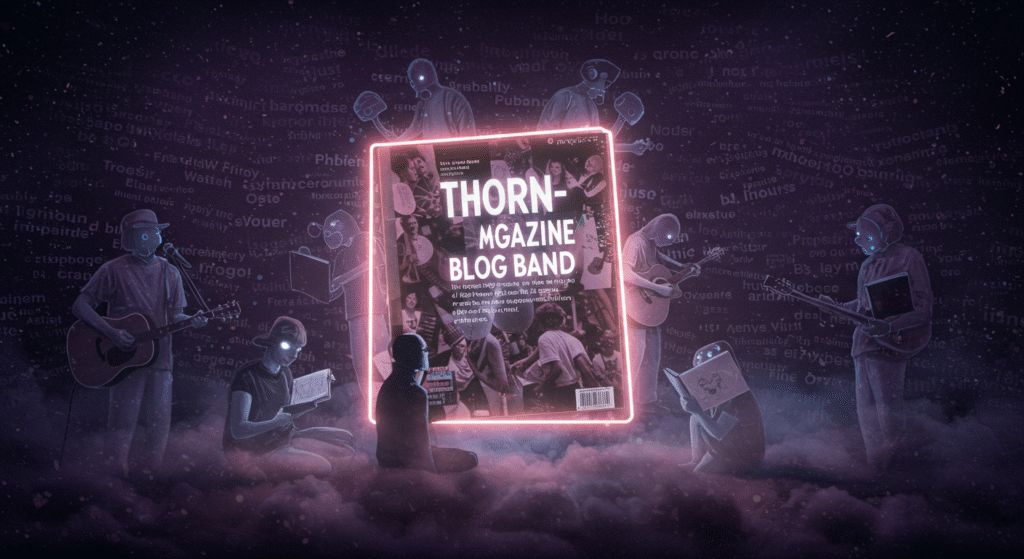What Is “Thorn-Magazine Blog Band”?
The phrase “Thorn-Magazine Blog Band” sounds like a music group, a blog, or a magazine. People search for it, thinking it’s real. But it’s not. This keyword is a mix of words used to trick search engines like Google. It’s not a real brand or project. As an internet safety writer, I, Ramona P. Woodmansee, study how online tricks work. My goal is to explain this keyword clearly so you understand it and stay safe online.
Breaking Down the Words
Let’s look at the parts of “Thorn-Magazine Blog Band”:
- Thorn: This could be a band name, a person, or something made up. Some bands are called “Thorn” or “The Thorns,” but they don’t connect to this phrase.
- Magazine: This makes you think of a publication, like a music zine. A small zine called “Thorn Magazine” exists, but it’s not tied to a “blog band.”
- Blog Band: This sounds like a group that blogs and makes music. But no real group uses this name.
These words sound interesting together, but they don’t point to one real thing. They’re combined to catch your attention online.
Why It Feels Real

Some websites talk about “Thorn-Magazine Blog Band” like it’s a music group or creative project. They mention indie music, stories, or art. This makes the keyword seem real. But these sites often repeat the same ideas without proof. They might say it’s a “creative collective” or “storytelling platform” but give no details, like names of people or songs. This shows the keyword is not tied to a real brand.
How This Keyword Tricks People
The phrase “Thorn-Magazine Blog Band” confuses people in a few ways. It makes you think you’ll find a cool band or blog. Instead, you get unhelpful websites. Here’s how it happens:
- Vague Words: Many sites call it a “music movement” or “indie platform” but don’t share real facts, like who runs it or what they do.
- Copied Text: Some pages use the same sentences. For example, two sites might both say “authentic storytelling” without new ideas. This means they copy each other.
- No Real Source: A real brand has a website, social media, or news stories. But “Thorn-Magazine Blog Band” has none of these. Most mentions come from low-quality blogs.
These tricks waste your time. You deserve clear, honest answers when you search online.
Where Did This Keyword Come From?
The keyword “Thorn-Magazine Blog Band” likely started as an SEO trick. SEO stands for Search Engine Optimization. It’s a way to make websites show up higher on Google. Some sites use long, specific phrases like this one to get clicks. They mix words like “thorn,” “magazine,” and “blog band” to sound exciting. These words appeal to people who like indie music or blogs. Over time, more sites used the phrase, making it seem popular. But it doesn’t lead to a real band or magazine.
How SEO Tricks Work
SEO can be used for good, like helping real bands get found. But some websites use it to trick people. They pick long phrases that are easy to rank for. “Thorn-Magazine Blog Band” is one of those phrases. These sites create pages with little information to get your clicks. They might talk about music or art but leave you with no real answers.
Why This Keyword Hurts Your Search

Misleading keywords like “Thorn-Magazine Blog Band” make searching harder. Here’s why:
- Wastes Time: You spend time reading pages that don’t help. Instead of finding a band or blog, you get vague words.
- Breaks Trust: When search results lead to bad pages, you might not trust Google or websites as much.
- Hides Real Creators: Real indie bands or zines get pushed down by fake content. This makes it harder for them to be found.
Google wants to show helpful, true results. Keywords like this go against that goal by filling search results with junk.
How to Spot Fake Keywords
I’ve studied online tricks for years. Here are ways to spot misleading keywords like “Thorn-Magazine Blog Band”:
- Weird Word Mixes: If a phrase sounds odd, like words thrown together, it might be fake.
- No Official Pages: Real brands have websites, social media, or news. If you can’t find these, the keyword might not be real.
- Same Words Everywhere: If many sites repeat the same ideas, they might be copying each other.
- No Clear Details: Articles that promise big things, like “new music revolution,” but lack facts are not trustworthy.
To stay safe, check who wrote the article. Look for their name, contact info, or links to real websites. If these are missing, the page might not be honest.
How to Find Real Indie Music and Blogs
If you want real indie music or blogs, avoid keywords like “Thorn-Magazine Blog Band.” Try these tips:
- Use Clear Words: Search for specific things, like “indie bands 2025” or “music zines.” These give better results.
- Check Real Sources: Look for band websites, social media, or platforms like Bandcamp. Real creators share their work.
- Read Trusted Sites: Visit well-known music blogs, like Pitchfork or Stereogum, for honest news.
- Skip Vague Pages: If a page feels empty or repeats itself, find a better one.
These steps help you find real music and stories without getting tricked.
The Bigger Problem with Fake Keywords
Misleading keywords are a big issue. They make the internet less trustworthy. When search results show fake or empty pages, it’s harder to find good information. This also hurts small creators, like indie bands or zine writers, who get hidden by bad content. Understanding keywords like “Thorn-Magazine Blog Band” helps us push for a better, honest internet.
Why It Matters
Fake keywords don’t just waste time. They can:
- Confuse People: You might think a fake brand is real and spend time looking for it.
- Hurt Real Creators: Small bands or blogs lose attention when fake pages rank higher.
- Lower Internet Quality: Too many bad pages make it harder to trust what you read online.
By spotting these tricks, you can help make the internet better.
What Can Fix Misleading Keywords?
Fixing fake keywords takes work from everyone:
- Google’s Job: Google can update its rules to push down bad content. It’s already trying with things like the Helpful Content Update.
- Website Owners: People who make websites should share real, helpful information, not tricks.
- You, the User: Click on trustworthy sites. Skip pages that feel fake. You can also tell Google about bad pages.
Together, we can make search results cleaner and more helpful.
Stay Safe Online
The keyword “Thorn-Magazine Blog Band” is not a real brand. It’s a trick to get clicks on search engines. By learning how it works, you can avoid wasting time on bad websites. I’m Ramona P. Woodmansee, and I’ve spent years helping people stay safe online. My advice is to always check where information comes from. Look for clear facts and trusted websites. This way, you’ll find the real indie music and blogs you love without falling for SEO tricks.
Disclaimer: This article is only for learning and awareness. It does not promote fake keywords or SEO tricks. The goal is to help readers stay safe online and understand how search engines work.
Explore More
- Why ‘a @rivenisnet’ Looks Fake and Untrustworthy
- The Truth About Pick-Kart .com: Should You Trust This Site?
